
BIOLOGICAL JOURNAL OF THE LINNEAN SOCIETY
Scope & Guideline
Exploring the depths of biodiversity and behavior.
Introduction
Aims and Scopes
- Evolutionary Biology:
The journal consistently publishes studies that explore evolutionary processes, including speciation, adaptation, and phylogenetic relationships among organisms. - Ecological Interactions:
Research on interactions among species, such as predator-prey dynamics, mutualisms, and competition, is a core focus, highlighting the ecological complexities that shape biodiversity. - Conservation Biology:
The journal emphasizes the importance of conservation research, providing insights into the genetic, ecological, and evolutionary factors that impact species survival and ecosystem health. - Genomics and Molecular Biology:
Recent studies often utilize genomic data to investigate evolutionary relationships and ecological adaptations, reflecting a trend towards molecular approaches in understanding biological phenomena. - Behavioral Ecology:
Behavioral studies, particularly those examining mating systems, social structures, and foraging strategies, are frequently featured, contributing to our understanding of animal behavior in ecological contexts. - Biogeography:
Research focusing on the geographical distribution of species and the historical processes that influence these patterns is a significant area of interest.
Trending and Emerging
- Climate Change Impact Studies:
Research investigating the effects of climate change on biodiversity, species distribution, and ecological interactions is increasingly prominent, reflecting global environmental concerns. - Genomic and Transcriptomic Analyses:
There is a growing trend towards using genomic and transcriptomic data to explore evolutionary questions, indicating a shift towards molecular biology methodologies in understanding evolutionary processes. - Urban Ecology and Evolution:
Studies examining how urban environments influence species adaptation and behavior are on the rise, highlighting the interactions between human activity and ecological dynamics. - Microbiome Research:
Emerging research on the role of microbiomes in health, behavior, and ecology is gaining traction, indicating an increased interest in the complex interactions between hosts and their microbial communities. - Functional Morphology:
Research that connects morphological traits to functional outcomes in ecological contexts is becoming more prevalent, reflecting a trend towards integrative biology that combines form and function. - Conservation Genomics:
The application of genomic techniques to conservation biology is increasingly common, emphasizing the need for genetic data in informing conservation strategies and understanding population dynamics.
Declining or Waning
- Morphological Studies without Ecological Context:
There has been a noticeable decrease in purely morphological studies that do not link findings to ecological or evolutionary implications, as the journal increasingly favors integrative approaches. - Traditional Taxonomy:
While taxonomy remains important, there is a waning emphasis on purely descriptive taxonomic work without molecular or ecological insights, as the field moves towards more dynamic and integrative methodologies. - Paleontology and Historical Biology:
Research in paleobiology, although foundational, appears less frequently, possibly due to a growing focus on contemporary ecological and evolutionary processes over historical perspectives. - Basic Physiological Studies:
Studies that focus solely on physiological aspects without connecting them to broader ecological or evolutionary questions are becoming less common, as interdisciplinary approaches gain prominence.
Similar Journals
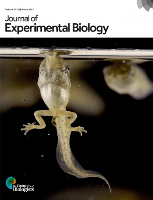
JOURNAL OF EXPERIMENTAL BIOLOGY
Catalyzing Progress in the World of Experimental BiologyJOURNAL OF EXPERIMENTAL BIOLOGY, published by COMPANY BIOLOGISTS LTD, stands as a cornerstone in the fields of Animal Science, Aquatic Science, Ecology, Insect Science, and Physiology. With a rich history dating back to 1945, this esteemed journal has continually provided a platform for high-quality research, evidenced by its impressive Q1 rankings across multiple categories in the 2023 Journal Citation Reports. Located in the United Kingdom, it serves an international audience, offering critical insights and advancements in various biological sciences. As a non-open access journal, it provides rigorous peer-reviewed articles that contribute profoundly to our understanding of biological processes and their implications. With an extensive reach among researchers, practitioners, and academia, the JOURNAL OF EXPERIMENTAL BIOLOGY is not only a repository of knowledge but also a catalyst for ongoing research and innovation in experimental biology.

Biology Letters
Exploring the frontiers of biological inquiry with precision.Biology Letters, published by the esteemed Royal Society, stands at the forefront of research in the field of biological sciences, with a strong emphasis on innovative studies that bridge gaps across disciplines. Since its inception in 2005, the journal has garnered significant recognition, achieving a remarkable Q1 ranking in Agricultural and Biological Sciences (miscellaneous) and a percentile of 88th in the same category, according to Scopus rankings. Released in the United Kingdom, the journal offers a platform for authors to share concise research findings and theoretical perspectives that contribute meaningfully to the advancement of biological inquiry. Although not open access, the journal remains highly regarded in the academic community for its rigorous peer-review process and impactful content, making it an invaluable resource for researchers, professionals, and students dedicated to exploring the complexities of biology. With an ongoing commitment to excellence, Biology Letters continues to shape the future of biological sciences.

Annual Review of Ecology Evolution and Systematics
Pioneering Research in Ecology, Evolution, and SystematicsThe Annual Review of Ecology, Evolution, and Systematics, published by Annual Reviews, is a leading academic journal dedicated to advancing the understanding of ecological and evolutionary processes. With a commendable impact factor and impressive rankings—9th in both the Ecology, Evolution, Behavior and Systematics category and the Environmental Science category—this journal is recognized for its rigorous peer-reviewed articles that synthesize research findings across a wide range of topics within the fields of ecology and evolutionary biology. Established in 2003, this annual publication aims to provide researchers, professionals, and students with comprehensive insights into the latest developments and trends within these dynamic disciplines. By facilitating access to high-quality scholarly articles, the Annual Review of Ecology, Evolution, and Systematics continues to play a crucial role in fostering scientific discourse and discovery.
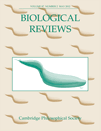
BIOLOGICAL REVIEWS
Delivering high-quality insights in biochemistry and molecular biology.BIOLOGICAL REVIEWS is a prestigious academic journal published by Wiley, focusing on the expansive fields of Agricultural and Biological Sciences and Biochemistry, Genetics and Molecular Biology. Established in 1924, the journal has upheld its reputation for over a century, advancing both theoretical and applied research aimed at addressing critical biological challenges. With an impressive 2023 Q1 ranking in both its primary categories and a Scopus ranking that places it among the top journals worldwide—ranked #2 in Agricultural and Biological Sciences and #8 in Biochemistry—BIOLOGICAL REVIEWS is at the forefront of scientific inquiry. Researchers, professionals, and students will find a wealth of knowledge in its comprehensive review articles, providing valuable insights into the latest findings and methodologies in the biological sciences. Although not an Open Access journal, its rigorous peer-review process ensures the dissemination of high-quality, impactful research, contributing to advancements in the field while fostering a collaborative scientific community.
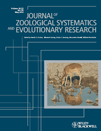
JOURNAL OF ZOOLOGICAL SYSTEMATICS AND EVOLUTIONARY RESEARCH
Transforming Insights into Evolutionary UnderstandingThe Journal of Zoological Systematics and Evolutionary Research, published by Wiley-Hindawi, stands as a premier academic journal since its establishment, showcasing cutting-edge research in the fields of Animal Science, Zoology, and Ecology. With an impressive track record spanning from 1963 to the present, this journal has earned a Q1 classification in both Animal Science and Ecology, as well as recognized rankings in Genetics and Molecular Biology. Its impact is highlighted by its Scopus ranks, placing it in the top percentile for relevant categories, underscoring its vital role in advancing knowledge and understanding within these disciplines. Researchers, professionals, and students will find a wealth of high-quality, peer-reviewed articles that contribute to the evolutionary understanding of biodiversity and systematics. Though not an Open Access journal, it remains accessible to a wide audience committed to exploring the intricacies of zoology and evolutionary biology.

INSECTES SOCIAUX
Pioneering research in insect science and ecology.INSECTES SOCIAUX, published by SPRINGER BASEL AG, is a prestigious international journal established in 1954, dedicated to advancing the field of insect science and ecology. With a robust ISSN of 0020-1812 and an E-ISSN of 1420-9098, INSECTES SOCIAUX maintains a significant impact within its category, boasting a Q2 ranking in both Ecology, Evolution, Behavior and Systematics and Insect Science. This journal serves as a vital platform for researchers and professionals looking to publish high-quality research that enhances our understanding of social insects, their behaviors, interactions, and ecological roles. Despite not being open access, INSECTES SOCIAUX remains a valuable resource, ensuring that critical scientific findings reach the broader academic community. With a comprehensive scope that merges diverse aspects of insect studies, this journal is essential for those engaged in ecological research and insect biology, facilitating an invaluable exchange of knowledge from its headquarters in Basel, Switzerland.
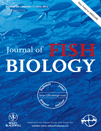
JOURNAL OF FISH BIOLOGY
Innovating Understanding of Aquatic EcosystemsJOURNAL OF FISH BIOLOGY, published by Wiley in the United Kingdom, is a distinguished peer-reviewed journal dedicated to advancing the understanding of the biology and relationships of fishes. With a robust history from its inception in 1969 to its future publications extending into 2024, the journal occupies a pivotal position in the academic landscape of aquatic sciences and ecology. Holding a notable Impact Factor and recognized within the second quartile (Q2) for both Aquatic Science and Ecology, Evolution, Behavior and Systematics, it serves as an essential resource for researchers, professionals, and students alike. The journal’s contributors delve into diverse topics ranging from evolutionary biology to conservation strategies, fostering a dynamic interchange of knowledge and innovation within the fish biology community. Access options are currently via subscription, ensuring high-quality, curated content that reflects the latest empirical research and theoretical advancements in the field.
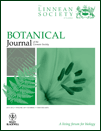
BOTANICAL JOURNAL OF THE LINNEAN SOCIETY
Cultivating Insights into Plant Biology and EcosystemsThe Botanical Journal of the Linnean Society, published by Oxford University Press, stands as a premier platform for interdisciplinary research within the realms of Ecology, Evolution, Behavior, and Plant Science. With a notable impact factor reflective of its esteemed reputation, this journal is classified in the Q1 quartile for both Ecology and Plant Science, placing it among the most influential publications in these fields. Since its inception in 1969, and with an anticipated convergence of research extending to 2024, it has become essential for scholars and professionals seeking to engage with cutting-edge studies, theoretical frameworks, and practical applications that drive our understanding of plant biology and ecological systems. The journal’s commitment to excellence is underscored by its robust Scopus rankings—achieving an impressive 83rd percentile in Ecology and a 82nd percentile in Plant Science. This makes the Botanical Journal of the Linnean Society a crucial resource for researchers, educators, and students alike, eager to advance their knowledge and contribute to the evolving discourse in botany and environmental studies.

ZOOLOGICHESKY ZHURNAL
Pioneering research in zoology for over seven decades.Zoologichesky Zhurnal, a prominent journal in the field of Ecology, Evolution, Behavior and Systematics, has been a vital publication since its inception in 1950. Published by MAIK Nauka-Interperiodica in the Russian Federation, this journal has established a notable reputation in disseminating scientific research and advancing knowledge in zoology. With its coverage spanning from 1950 to 2023, and a specific convergent focus during 1982-1983, this journal contributes significantly to the ecological and evolutionary sciences, even though it currently holds a Q4 classification in the 2023 category quartiles, indicating its niche positioning among peers. Researchers and students engaged in the study of biological sciences, particularly those interested in the dynamics of ecosystems, behavior of species, and evolutionary processes, will find valuable insights and original research articles within its pages. While access to this esteemed journal is not open, it remains an essential resource for those seeking to deepen their understanding of zoological sciences.

CANADIAN JOURNAL OF ZOOLOGY
Connecting Researchers with the Heart of Zoological ScienceWelcome to the Canadian Journal of Zoology, a leading academic journal in the fields of Animal Science and Zoology as well as Ecology, Evolution, Behavior and Systematics. Published by Canadian Science Publishing since 1965, this esteemed journal serves as a vital platform for researchers, professionals, and students to disseminate and engage with significant findings in zoological and ecological research. With an impact factor placing it in the Q2 category and rankings reflecting its influence (201/490 in Animal Science and Zoology; 372/721 in Ecology), the journal is committed to advancing the understanding of animal biology and environmental interactions. Although currently not an open access publication, it provides comprehensive resources and studies that are crucial for the academic community. Based in Ottawa, Canada, the journal continues to push the boundary of knowledge right up to 2024 and beyond, making it an essential resource for anyone dedicated to the life sciences.